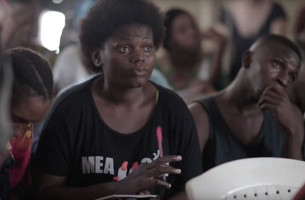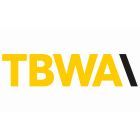
Your Shot: How TBWA\Khanga Rue is Sharpening the Minds of Tanzania’s Youth

Only 35% of young people in Tanzania complete secondary schooling. And for those fortunate enough to do so there are only 40,000 formal salaried jobs created each year for 700,000 people who are ready to enter the job market. In a bid to tackle the problem - and despite being initially rejected funding - TBWA\Khanga Rue has launched ‘Noa Ubongo’ or ‘Sharpen Your Brain’ in Swahili, a free 12-class series on entrepreneurship aimed at the country’s youth. It’ll be pushed out via social media and in thousands of Tanzania’s ‘video halls’ - a big part of community life and media consumption in the country - and follows a successful pilot scheme that went live in 2016.
Eager to know more, LBB’s Addison Capper caught up with Pat Olvera, Creative Director at TBWA\Khanga Rue.
LBB> What initially inspired this project? Why was it something that you wanted to do as an agency?
PO> We live and work in Tanzania and East Africa. This project is personal. It’s about our communities, our neighbourhoods. We have team members who at some point not too long ago were stuck in the same rut as some of the youth we are targeting. Although this is certainly the biggest initiative we’ve undertaken, it’s not the first time we’ve gotten involved in issues that affect our region.
LBB> Was UNICEF an official client on this project or was it more of a partnership?
PO> Unicef was not a client on this particular project, though we have worked with Unicef on other projects creating youth programming. We take a human-centred approach to a lot of our work and working with Unicef in the past – and a few others – has allowed our creative team to spend a lot of time with Tanzanian youth, which was invaluable to the development of Noa Ubongo.
Noa Ubongo was entirely our initiative and we funded its development, pilot and launch. The first to come on board was the Financial Sector Deepening Trust (FSDT), which asked us if we could create a five-class series on entrepreneurship. We decided that wasn’t enough and matched the financing to create a 12-class series. Now FSDT is going to finance video hall viewing clubs in five major cities. They have jumped on board our mission.
LBB> Can you tell us more about the video halls? Are these an important part of the community in Tanzania?
PO> USAID commissioned a study and they estimated that there are 10,000 of them, although I suspect there are more. You find them all across East Africa. It’s usually a TV with makeshift benches or plastic chairs, usually in a dark stuffy room tucked away out of sight. You have to keep your eyes open to notice them. Most play action movies, Nigerian movies, Kung Fu movies and football. Big Premier League games are when they become really packed.
They are an important part of the community, although not necessarily always a positive one. We are trying to change that of course. Like anywhere else, places that attract a lot of idle youth tend to get a bad reputation. But I should note that there is also a booming movie scene here and these provide the biggest outlet for homegrown content, so they provide that function as well.
LBB> Why do you think you were refused funding? And why did you decide to go ahead with this regardless?
PO> Well, I think we were refused funding because we aren’t an NGO. I think there was this sense that “wait, you’re an advertising agency, you aren’t supposed to be doing this stuff” and we were encroaching on their turf. I understand it. We wouldn’t be nearly as successful with this initiative if we had received the funding. There are so many constraints to creativity, to experimentation, to failure. The decision to go through with it wasn’t hard. I don’t think we debated it much. We believed in it and had worked really hard to develop the concept. I should also note that a lot of experts volunteered their time and expertise and we couldn’t let that go to waste.
LBB> How did you source the teachers and what guided your decisions?
PO> For our on-camera ‘teachers’ we did a wide casting call. We wanted to replicate the feeling of a ‘peer-to-peer learning environment,’ so we were looking for youth who came from similar backgrounds of our target audience, but who could deliver on camera in a way that made the videos feel personalised and the learning universal. A lot of the comments we receive are to our teachers directly, not Noa Ubongo.
LBB> What were the trickiest components when actually producing the films? Finding a balance between engaging online content and educational film must have been tricky…
PO> Making the material relevant to the youth in their context. How do you teach someone how to make a business plan for a roadside food cart? Well, you first have to actually make a business plan for a roadside food cart yourself! That was the real challenge. If the material wasn’t relatable, if the case studies we used didn’t seem attainable, this would never work. Our team really rolled up its sleeves and dove into the material.
The video production – the technical aspect – was actually pretty easy. From a production standpoint, it’s not too complex. We have a full content-making division, so that we were confident in.
LBB> What kind of reaction have you seen to the project?
PO> Absolutely overwhelming. We had a hunch this would resonate, but not like this. If you spoke Swahili and could see the comments people made on our Facebook page, you’d understand. We have youth who have told us that it’s changed their lives. We know people who after watching our classes have gotten jobs, started businesses, and succeeded.
LBB> Interest in the programme has really risen recently and you’ve already piloted a Kenyan version - how can you see it evolving in the future?
PO> That has to do with the above answer. There has also been a tremendous response from other institutions who want to be a part of it.
In the future, we want to expand our video hall distribution. We will create an interactive platform where students get an identity and can submit things for review, both by peers and experts, such as business plans, CVs, etc. Of course, we will continue making classes. We have targeted urban youth, we need to do the same now for rural youth. We are creating classes on digital skills with Digital Opportunity Trust and we are also in talks about creating content for refugee camps.
LBB> Any parting thoughts?
PO> Looking back, we shouldn’t be so surprised at the success of Noa Ubongo. Ad agencies have a tremendous amount of capacity and talent that NGOs would struggle to match, especially when we leverage those talents in our areas of expertise: making content. We can solve problems, make an impact and do amazing work. This isn’t CSR. We expect it to be fully self sustaining by the end of the year. So we shouldn’t think of it as charity and we shouldn’t only do it when we want to win awards.













